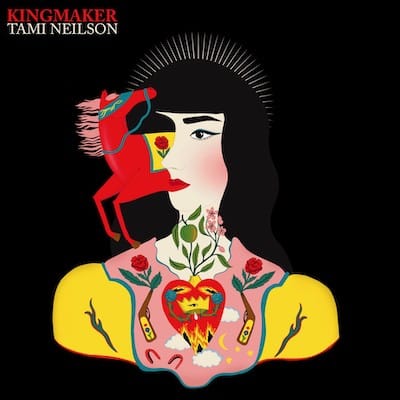
Tami Neilson
Kingmaker
Outside Music
2022
Born in Toronto but now based in Auckland, the winner of multiple country music awards and embracing a musical spectrum that also takes in gospel, soul and blues, Kingmaker is Tami Neilson‘s fifth studio album, one she describes as like a movie soundtrack unfolding with its songs addressing “the gatekeepers and ‘kingmakers’ who hold tightly to the keys of equity for women and minorities in the music industry and, more largely, society as a whole”.
As such, it opens with the dramatic, echoing twangsome guitar and soaring vocal cinematic title track, evocative of Morricone and Tiomkin, that sets out its thematic stall from the start with its images of an exploitative male-dominated industry (“Bottle up my lighting and sold for a dime”) and a declaration of female-empowerment (“It’s my blazing light that made your shadow tall/Now I see, you’re empty/And I’ve always been a King, after all”).
It’s a thread that she picks up later in the autobiographical King Of Country Music, a banjo, foot stomps and handclaps driven number evocative of Shirley Ellis, wherein she sings about being “most famous girl ain’t no-one heard of yet”, how, aged ten, her first show was opening for Kitty Wells singing Will The Circle Be Unbroken, moving on to the Nashville years (“Slipping demo tapes in laundry bags of stars”) to earning five gold trophies but that still you “Ain’t gonna hear me on no radio station”. It perfectly captures the message in its catchy refrain, “God is in the garden, Devil’s in the dirt/Eve is picking apples, Adam’s blaming her/Daddy was a guitar, Mama was a gun” as she asks, “Could the King of Country Music be the daughter not the son?”
A similar percussive arrangement with added drums and upright bass precedes it with Careless Woman, a song inspired by a dating tips article from a 1939 issue of Parade advising that “careless women never appeal to gentlemen”, that they shouldn’t “ talk like you got any thoughts in your head” and be subjugate to their men (“Don’t make me look bad in front of all the guys/Mine, mine, your body is mine/To play with it, legislate it, honey I’ll decide”), Neilson further enumerating a litany of supposed flaws (“she play too rough/She laugh too loud, she talk too much”), before, naturally declaring, backed by a chorus of female voices, “I wanna be her when I grow up”.
Sandwiched between, and continuing the Western movie ambience with is loping rhythm, dry whistling, strings and desert soundscape, Baby You’re A Gun, inspired by her reading of Dolly Parton’s autobiography, is another number about how society underestimates women (“When they look at you, they see a lover/Tongue of fire, dark velvet hands/Existing for their pleasure, waiting their command… When they look at you, they see a lady/China teacup, pour yourself out/Graciously accepting only what’s allowed”), the emancipative chorus declaring instead, “baby you’re a gun/They better run”.
A tender note is struck when, joined by Willie Nelson, she sings Beyond the Stars, a Marty Robbins-like waltzing co-write with Delaney Davidson about the loss of their fathers and the longing to be with them, Nelson taking on the persona of her dad, before she exchanges Patsy Cline comparisons for Bobbie Gentry on Green Peaches, a sultry drawled Southern gothic groove about the exploitation of young and vulnerable women (“you gotta know when to pick em/Before they’re too grown to see”) by men in power (“Man in a suit nods his head to the music with his arms folded cross his chest/Looking at her like she’s a lottery ticket or a horse that’s gonna win him the bet”), only to be cast aside when they’re burnt up (“She’s walking with the baby when she’s stopped by a lady ‘Ain’t you that girl had a hit or two?’/And she shakes her head and says, ‘Sorry Ma’am, I’m afraid that girl sure isn’t me/But I get it all the time’”).
She keeps the fire burning for the part spoken, queasy rock n roll urgency of Mama’s Talkin’, a number inspired by Kamala Harris’s response when being interrupted during a debate but, more specifically, fuelled by her own experience of a male artist repeatedly interrupting her when she was speaking to someone, stepping in front and blocking her with his back.
Two family connections follow, the retro border country and Latin sway melody of the strings swept I Can Forget being written by her father, Ron, and found on an old work tape to which she wrote the lyrics about being unexpectedly caught my memories seven years after his death, while the strings-soaked swampy soul The Grudge was inspired by the true story of her great-grandfather disowning her grandfather due to marrying outside of his faith, as she explores the patterns of learnt behaviour passed down through the generations and the need to break the chain of resentments.
It ends returning to her core theme about women in music and society with It Ain’t My Job, a voodoo rhythm blues where, coloured by sax and clarinet, she channels Big Mama Thornton as the universal woman declares her independence from domestic expectations (“You want me to cook you dinner but it ain’t my job”), exploitation (“You make me an offer that make me wanna holla/20 cents less on every damn dollar/You can stick it, put a pin in it ‘cause it ain’t my job”) and male-promulgated fantasies (“You want me to wear a little dress but it ain’t my job/And then you want me to show a little less but it ain’t my job/You tell me act my age, but don’t ya dare look it”), closing with a reference to how Dolly Parton refused to let Elvis sing I Will Always Love You because Col Parker demanded half of the publishing rights.
“Ain’t you heard me sing?” she asks. If you have, you know she well deserves that crown.
Kingmaker Release Date: Friday, July 15th
